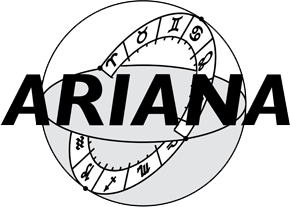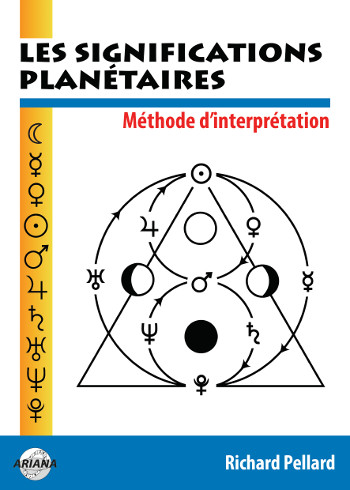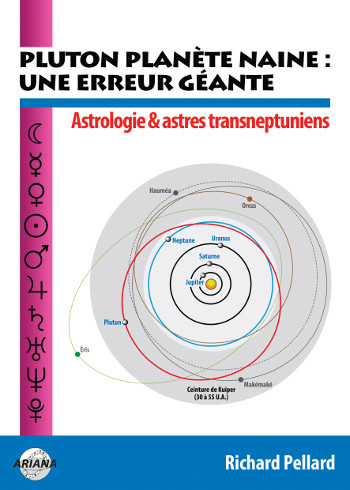Your Planets
Portraits of the Planets
Aspects between Planets
The planetary ages
The planetary families
Planets in Signs
The Planets in comics


The interpretation examples that we are suggesting are very far from being exhaustive : they only show and outline a general frame describing the issues of the aspect. They should therefore not be taken literally. Each being brings indeed its own responses, more or less original, to the questions raised by an aspect. There is no magic formula. Through using the R.E.T. and the Theory of Ages and combining logic, observation and imagination, you will be able to develop a thousand other possible meanings, a thousand other variations on the same theme.
“eR-tE” issue (existence of Representation & transcendance of Existence). How to blend switching from the unique to the duo-duel (Venus ‘eR’) with switching from the duo-duel to the multiple (Saturn ‘tE’)? How to operate together a skin-deep sentimentality and an experimental scepticism? How to stay charming and appealing while pondering the complexities of experience? This aspect excludes levels ‘r’ (decisive willpower) and ‘T’ (prospective imagination).
You are characterized by a complex and delicate affectivity, tender and deep feelings, by a cerebral nature which denies nothing of the realities of the heart. With you, the images-desires calling for immediate concretization are tempered by experience and cold reason. You dissect your likes and dislikes, likes and dislikes to try to glimpse their secret mechanisms, subtle causes, distant consequences or hidden meanings. Cautious and thoughtful, knowing that love and friendship are long and uncertain journeys, you strive to build stable, lasting and deep privileged relationships. You have a taste for rare pleasures and unknown, highly cerebral pleasures. You love with modesty, distance, silence and tenacity. Your feelings, by settling, gladly strip themselves of their emotional charge to turn towards abstraction or the quest for a hypothetical absolute. An austere thinker at times, you are not lacking in heart.
Balanced dissonance : you switch alternately from a skin-deep sentimentality (Venus) to an experimental scepticism (Saturn), without being able to bring yourself to choose. Depending on whether one or the other function dominates in your experience, you can adopt the following attitudes :
If and when Venus dominates : Above all, you fear affective frustrations, lack of love, sentimental estrangement. Your heart has reasons that wisdom totally ignores. In your dread of seeing your unsatisfied desires, your unfulfilled wishes, your unsatisfied whims, you struggle to enjoy voluptuously the good things in life before some catastrophe comes to deprive you of the beings or things that are dear to your heart. heart. You are incapable of stepping back, of analyzing the whys and wherefores of your likes and dislikes, likes and dislikes that are thoughtless and often without serious foundations. You prefer to let yourself be moved, touched and seduced rather than probing the beings and things that charm you. You take refuge in a cutesy aestheticism to escape cold abstractions, and worry that your taste for pleasure may be thwarted by unpleasant responsibilities.
If and when Saturn dominates : in the name of a cold and dry reason, of a hypothetical absolute or of an uncertain quest for meaning, you silence within you any sensitivity that you assimilate to sentimentality. Convinced that there is no happy love, you take malicious pleasure in forbidding yourself any satisfaction of your desires, in remaining deaf to the call of your senses. You seek to distance yourself as much as possible from any attachment, from any privileged relationship based on shared emotions, at the risk of isolation or a more or less well accepted loneliness. You probe and auscultate hearts, without gentleness or tenderness, to discover their hidden workings. Your ascetic rigor forbids you to give in to the temptations and desires of the moment. By dint of prudence and foresight, you forbid yourself the ephemeral but real delights of passion.
If you learned to control this dissonance, you know that there is a time for experimental curiosity and a time for experiencing your loves, emotions and feelings, and know how to flawlessly alternate these two functions.
If you managed to sublimate this dissonance, you have deliberately sacrificed any carnal or emotional attachment for the sake of a laborious experimental research ; or you have abdicated any disenchanted pursuit of the hidden meaning of your experiences in favour of tender and voluptuous feelings.
▶ Introduction aux significations planétaires
▶ The Venusian: Psychological profile
▶ The mercurian function ‘tR’ (transcendence of Representation)
▶ Venusian stage (from 3 to 7 1/2 months old): the age of affection
▶ Sun-Mercury-Venus: extensive Representation
▶ Venus-Mars-Neptune: intensive existence
▶ The Saturnian: Psychological profile
▶ The saturnian function ‘tE’ (transcendence of Existence)
▶ Saturnian stage (from 12 to 30 years old): the age of questioning
▶ Mars-Jupiter-Saturn: extensive Existence
▶ Mercury-Saturn-Pluto: intensive transcendence

Les significations planétaires
par
620 pages. Illustrations en couleur.
La décision de ne traiter dans ce livre que des significations planétaires ne repose pas sur une sous-estimation du rôle des Signes du zodiaque et des Maisons. Le traditionnel trio Planètes-Zodiaque-Maisons est en effet l’expression d’une structure qui classe ces trois plans selon leur ordre de préséance et dans ce triptyque hiérarchisé, les Planètes occupent le premier rang.
La première partie de ce livre rassemble donc, sous une forme abondamment illustrée de schémas pédagogiques et tableaux explicatifs, une édition originale revue, augmentée et actualisée des textes consacrés aux significations planétaires telles qu’elles ont été définies par l’astrologie conditionaliste et une présentation détaillée des méthodes de hiérarchisation planétaire et d’interprétation accompagnées de nombreux exemples concrets illustrés par des Thèmes de célébrités.
La deuxième partie est consacrée, d’une part à une présentation critique des fondements traditionnels des significations planétaires, d’autre part à une présentation des rapports entre signaux et symboles, astrologie et psychologie. Enfin, la troisième partie présente brièvement les racines astrométriques des significations planétaires… et propose une voie de sortie de l’astrologie pour accéder à une plus vaste dimension noologique et spirituelle qui la prolonge et la contient.
Téléchargez-le dès maintenant dans notre boutique

Pluton planète naine : une erreur géante
par
117 pages. Illustrations en couleur.
Pluton ne fait plus partie des planètes majeures de notre système solaire : telle est la décision prise par une infime minorité d’astronomes lors de l’Assemblée Générale de l’Union Astronomique Internationale qui s’est tenue à Prague en août 2006. Elle est reléguée au rang de “planète naine”, au même titre que les nombreux astres découverts au-delà de son orbite.
Ce livre récapitule et analyse en détail le pourquoi et le comment de cette incroyable et irrationnelle décision contestée par de très nombreux astronomes de premier plan. Quelles sont les effets de cette “nanification” de Pluton sur son statut astrologique ? Faut-il remettre en question son influence et ses significations astro-psychologiques qui semblaient avérées depuis sa découverte en 1930 ? Les “plutoniens” ont-ils cessé d’exister depuis cette décision charlatanesque ? Ce livre pose également le problème des astres transplutoniens nouvellement découverts. Quel statut astrologique et quelles influences et significations précises leur accorder ?
Enfin, cet ouvrage propose une vision unitaire du système solaire qui démontre, chiffes et arguments rationnels à l’appui, que Pluton en est toujours un élément essentiel, ce qui est loin d’être le cas pour les autres astres au-delà de son orbite. Après avoir lu ce livre, vous saurez quoi répondre à ceux qui pensent avoir trouvé, avec l’exclusion de Pluton du cortège planétaire traditionnel, un nouvel argument contre l’astrologie !
Téléchargez-le dès maintenant dans notre boutique